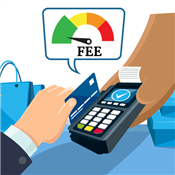Interchange Rates
See detailed breakdowns of the current interchange rates for Visa, Mastercard, Discover®, and Amex. Plus, learn how you can save on interchange fees.
 |
- What are Interchange Fees?
- Average Interchange Rates
- Visa Interchange Fees
- Mastercard Interchange Fees
- Discover Interchange Fees
- American Express Interchange Fees
- What Determines Interchange Rates?
- Ways to Save on Interchange Rates
- How are Interchange Fees Charged?
- Can You Avoid Paying Interchange Fees?
- Can You Negotiate Interchange Fees?
Interchange fees are the largest portion of your credit card processing costs. Unfortunately, these fees are mandatory, and they're set by credit card networks.
But that doesn't mean there aren't ways to save.
In this guide, learn everything you need to know about interchange fees, including how they're determined and different types of pricing.
Or you can jump to:
- Visa Interchange Fees
- Mastercard Interchange Fees
- Discover Interchange Fees
- American Express Interchange Fees
Focus on what matters most—running your business.Click your state to find the best credit card processor for your growing business.
What Are Interchange Fees?
When a customer pays with a debit or credit card, the bank that issued the card gets a cut of the transaction. This is called the interchange fee (or "wholesale" processing fee). It's meant to cover the banks' operation costs and risk of fraud.
Interchange fees make up the bulk of your total credit card processing fees. There are different rates for different types of cards and transaction categories.
These fees are set by the credit card networks (Visa, Mastercard, Discover®, and American Express). Each card association has its own schedule of interchange fees, which you'll find below.
Average Interchange Rates
The typical interchange rate is 1.6% - 2.4% for credit cards and 0.5% for debit cards.
Here are the average credit card processing fees for the 4 major credit card networks:
- Visa: 1.6% - 2.6%
- Mastercard: 1.6% - 2.5%
- Discover: 1.55% - 2.5%
- American Express: 2.3% - 3.5%
Below, review some of the most common interchange fees you may encounter for each card association.
Note: The credit card networks typically update their interchange fees twice a year, in April and October.
PRO TIP: Are you being overcharged for your credit card processing? Try our interactive quiz now and unveil the truth about your rates. Be in control of your finances and avoid hidden costs.
How to Get the Best Processing Deal
Don't want to pay a markup with every transaction? A subscription service like Stax charges just one flat rate per month, with no additional markup.
If your business processes over $15k a month, this could turn out to be a much better value. Find out how much you could save with Stax today.
Save Up to 40%
- Flat Monthly Subscription Price, Starting at $99
- 0% Markup on Direct-Cost Interchange
- 24/7 Support
Visa Interchange Fees
Visa interchange fees as of October 2023:[1]
| Visa Debit Card | Swipe Rate (card present) |
|---|---|
| Visa Debit (small bank) | 0.80% + $0.15 |
| Visa Prepaid (small bank) | 1.15% + $0.15 |
| Visa Debit and Prepaid (big bank/regulated) | 0.05% + $0.22 |
| Visa Debit Card | Keyed Rate (card not present) |
| Visa Debit (small bank) | 1.65% + $0.15 |
| Visa Prepaid (small bank) | 1.75% + $0.20 |
| Visa Debit and Prepaid (big bank/regulated) | 0.05% + $0.22 |
| Visa Credit Card | Interchange Rates |
| Visa Infinite (Spend Qualified) | 2.30% + $0.10 |
| Visa Infinite (Spend Not Qualified) | 1.90% + $0.10 |
| Visa Signature Preferred | 2.10% + $0.10 |
| Visa Signature | 1.65% + $0.10 |
| Traditional Rewards and All Other Products | 1.51% + $0.10 |
Mastercard Interchange Fees
Mastercard interchange fees as of April 2023:[2]
| Mastercard Debit Card | Swipe Rate (card present) |
|---|---|
| Mastercard Debit (small bank) | 1.05% + $0.15 |
| Mastercard Prepaid (small bank) | 1.15% + $0.15 |
| Mastercard Debit and Prepaid (big bank/regulated) | 0.05% + $0.22 |
| Mastercard Debit Card | Keyed Rate (card not present) |
| Mastercard Debit (small bank) | 1.65% + $0.15 |
| Mastercard Prepaid (small bank) | 1.76% + $0.20 |
| Mastercard Debit and Prepaid (big bank/regulated) | 0.05% + $0.22 |
| Mastercard Credit Card | Swipe Rate (card present) |
| Mastercard Core | 1.65% + $0.10 |
| Mastercard Enhanced Value | 1.80% + $0.10 |
| Mastercard World | 1.90% + $0.10 |
| Mastercard World High Value | 2.30% + $0.10 |
| Mastercard Worl Elite | 2.30% + $0.10 |
| Mastercard Credit Card | Keyed Rate (card not present) |
| Mastercard Core | 1.95% + $0.10 |
| Mastercard Enhanced Value | 2.10% + $0.10 |
| Mastercard World | 2.20% + $0.10 |
| Mastercard World High Value | 2.60% + $0.10 |
| Mastercard World Elite | 2.60% + $0.10 |
Discover Interchange Fees
| Discover Debit Card | Swipe Rate (card present) |
|---|---|
| Discover Debit (small bank) | 1.10% + $0.16 |
| Discover Debit (big bank/regulated) | 0.05% + $0.22 |
| Discover Debit Card | Keyed Rate (card not present) |
| Discover Debit (small bank) | 1.75% + $0.20 |
| Discover Debit (big bank/regulated) | 0.05% + $0.22 |
| Discover Credit Card | Swipe Rate (card present) |
| Discover Consumer | 1.56% + $0.10 |
| Discover Rewards | 1.71% + $0.10 |
| Discover Premium | 1.71% + $0.10 |
| Discover Premium Plus | 2.15% + $0.10 |
| Discover Commercial | 2.30% + $0.10 |
| Discover Credit Card | Keyed Rate (card not present) |
| Discover Consumer | 1.87% + $0.10 |
| Discover Rewards | 1.97% + $0.10 |
| Discover Premium | 2.00% + $0.10 |
| Discover Premium Plus | 2.40% + $0.10 |
| Discover Commercial | 2.30% + $0.10 |
| Discover Recurring Payments | Interchange Rates |
| Discover Debit (small bank) | 1.20% + $0.05 |
| Discover Debit (big bank/regulated) | 0.05% + $0.22 |
| Discover Consumer | 1.35% + $0.05 |
| Discover Rewards | 1.35% + $0.05 |
| Discover Premium | 1.35% + $0.05 |
| Discover Premium Plus | 1.80% + $0.05 |
| Discover Commercial | 2.3% + $0.10 |
| Discover International | Swipe Rate (card present) |
| Discover International Debit/Prepaid | 1.20% |
| Discover International Consumer | 1.65% |
| Discover International Rewards | 1.65% |
| Discover International Premium | 1.65% |
| Discover International Premium Plus | 1.65% |
| Discover International Commercial | 1.9% |
| Discover International | Keyed Rate (card not present) |
| Discover International Debit/Prepaid | 1.70% + $0.10 |
| Discover International Consumer | 1.70% + $0.10 |
| Discover International Rewards | 1.70% + $0.10 |
| Discover International Premium | 1.70% + $0.10 |
| Discover International Premium Plus | 1.79% + $0.10 |
| Discover International Commercial | 1.90% + $0.10 |
American Express Interchange Fees
American Express has a more complex fee structure.
For the other three networks, it's mostly the type of card and payment method that determines the interchange rate. But for Amex cards, it's the transaction size and merchant category that determine the interchange rate.
A lot of people use Amex credit cards for dining and travel. So the interchange rates are highest for merchants in those industries.
If you would like to accept Amex cards at your business, you have two ways to do it:
- OptBlue program: This option is best for smaller merchants. OptBlue allows your processing provider to bundle AmEx interchange rates with the other cards you accept. It's not standardized, so each provider could charge differently. Look for an interchange-plus provider that lists their Amex rates so you can compare.
- Direct agreement with Amex: Large businesses processing over $1 million in Amex transactions per year must enter a direct agreement. Under this agreement, you'll pay the standard Amex interchange rates, which are not published.
Since there's no standard Amex interchange rate for OptBlue, here are some sample rates from Payline Data.[3]
| Amex Retail | |
|---|---|
| Amex Retail under $75 | 1.60% + $0.10 |
| Amex Retail under $1,000 | 1.95% + $0.10 |
| Amex Retail over $1,000 | 2.40% + $0.10 |
| Amex Services | |
| Amex Services under $400 | 1.60% + $0.10 |
| Amex Services under $3,000 | 1.95% + $0.10 |
| Amex Services over $3,000 | 2.40% + $0.10 |
| Amex Restaurant & Caterers | |
| Amex Restaurant under $25 | 1.85% + $0.10 |
| Amex Restaurant under $150 | 2.45% + $0.10 |
| Amex Restaurant over $150 | 2.75% + $0.10 |
| Amex Lodging | |
| Amex Lodging under $100 | 2.25% + $0.10 |
| Amex Lodging under $1,000 | 2.60% + $0.10 |
| Amex Lodging over $1,000 | 3.00% + $0.10 |
| Amex Mail Order & Internet | |
| Amex Mail Order & Internet under $150 | 1.70% + $0.10 |
| Amex Mail Order & Internet under $3,000 | 2.05% + $0.10 |
| Amex Mail Order & Internet over $3,000 | 2.50% + $0.10 |
| Amex Prepaid | |
| Amex Prepaid under $75 | 1.35% + $0.10 |
| Amex Prepaid under $1,000 | 1.70% + $0.10 |
| Amex Prepaid over $1,000 | 2.15% + $0.10 |
What Determines Interchange Rates?
As you can see, there are dozens of interchange rates (and many more that aren't listed here). The rates vary based on the type of card, transaction method, and even type of business.
In general, the level of risk is what determines the interchange fee. Transactions with a higher risk of fraud have higher interchange rates.
Here are some major factors that affect the interchange fee:
Debit vs Credit Card
Debit cards have the lowest interchange fees because the risk is low. During a debit transaction, approval depends on if the person has enough money in the account.
But with a credit card, the bank is first covering the purchase, with hopes that the user will pay off the loan on time.
Standard vs. Rewards Card
Premium rewards credit cards have among the highest interchange fees because some of that is used to cover the cost of the rewards. Same goes for business credit cards.
In-Person vs. Online Transactions
In-person swipe and chip transactions have the lowest interchange fees since the risk of fraud is lowest. Online and keyed-in transactions have higher interchange fees because it's easier to use a stolen card.
Type of Business
All merchants receive a merchant category code (MCC) from their processor. These codes are based on your industry and may also come with different interchange rates. This is especially true for processing Amex cards.
Owner of the Card
There are even different rates based on whether the cardholder is a regular consumer, business, corporation, government agency, or nonprofit. A government agency would have lower interchange rates than consumers because there's less risk.
Ways to Save on Interchange Rates
Though interchange fees are non-negotiable, here are some ways to reduce them:
Use an Address Verification System
An address verification system (AVS) verifies that the billing address entered matches the address on file on the cardholder account. This is one of the best ways to help prevent fraud for card-not-present transactions.
Visa and Mastercard offer lower interchange rates if you use an AVS tool. Typically, with an AVS service, you'll pay a small fee per transaction. But the savings on interchange rates make up for it.
Settle batches every day
It's important to settle your transactions for processing on a daily basis. If you wait to settle, you could get a downgraded interchange rate up to 0.50% higher.
If you wait days to settle, the customer might get confused when they see the charge on their statement and choose to dispute it.
Encourage debit card payments
Debit cards have much lower interchange rates. For example, a standard Visa rewards credit card has an interchange fee of 1.51% + $0.10, while a Visa debit card is 0.05% + $0.22. On a $25 purchase, a debit card will cost you $0.23, compared to $0.48 for credit cards.
If you're a small local shop with a loyal customer base, you can explain to your customers that debit cards will help you stay in business. A lot of people would be happy to support their favorite stores.
Avoid manual entry
If you're taking cards in person, avoid manual entry as much as possible. Manually keyed-in transactions have the highest processing rates. If you get a card that's not swiping, ask if the customer has another payment method instead.
How Are Interchange Fees Charged?
To accept credit card payments, you need to sign up for a card processing service. All the fees are charged through the provider, including the interchange fees, provider markups, equipment fees, and other service costs. Your provider will pay the standard interchange fees to the issuing banks.
Each provider uses a different approach on how they charge their fees. Remember that interchange fees stay the same, so it comes down to how the provider charges their markup.
PRO TIP: Are you being overcharged for your credit card processing? Try our interactive quiz now and unveil the truth about your rates. Be in control of your finances and avoid hidden costs.
Some separate interchange fees from their own markups. Others blend it together, so it's harder to tell how much the provider is profiting.
There are 4 main pricing structures processing providers use.
1. Flat Rate
Best for: Small businesses processing under $5k/mo
This pricing model charges one flat-rate processing fee for every transaction - no matter if it's a debit or credit card, Visa or Amex. The interchange fee and markup are blended into the flat rate. An example is Square, which charges 2.6% + $0.10 per swipe.
But this rate can be high. For example, for debit card transactions, you don't get to benefit from the low interchange rate. The provider will profit more instead.
Usually, third-party processing providers (like Square and PayPal) use this pricing structure. It's ideal for new and very small businesses because the pricing is simple and you don't need to open a merchant account.
Square Reader: Free Mobile Credit Card Reader
- Pay 2.6% + 10¢ Per Swipe for Visa, Mastercard, Discover, and American Express
- Accept Credit Cards Anywhere
- Fast Setup, No Commitments
2. Interchange-Plus
Best for: Growing businesses processing $5k - $15k/mo
This pricing structure is very transparent. The interchange fees and processor markups are separated. You pay different rates with different types of cards.
An example is Helcim, which charges Interchange rate + 0.40% + $0.08 (for processing up to $50,000/mo; discounts for larger volume) per swipe. The "plus" part (0.40% + $0.08) is the provider's markup fee. This way, the processor fees are consistent, and you know exactly how much you're paying them.
This kind of pricing is offered by traditional merchant account providers. It's best for small to mid-size businesses because you can save a lot more.
Start Accepting Payments Fast
- Interchange Plus Pricing
- No Monthly Fees
- No Contracts
3. Subscription Pricing
Best for: Large businesses processing over $15k/mo
Just like interchange-plus, the processor markup is clearly spelled out. But it's just one small fixed per-transaction fee (instead of also a percentage markup). On top of that, you pay a subscription fee for the service.
An example is Payment Depot by Stax, which charges interchange rates plus a flat per-transaction fee with its monthly plans, starting at $99 for companies that process up to $150,000 in transactions per year.
For large businesses, this pricing structure will help you save the most because the 0% markup will more than justify the membership fee.
4. Tiered Pricing
Best for: Not recommended for any business
The tiered structure is meant to simplify pricing. Instead of the hundreds of different interchange rates, you get just 3 flat rates depending on the type of card used.
- Qualified rates for debit cards and non-rewards cards
- Mid-qualified rates for standard rewards cards
- Non-qualified rates for premium cards and card-not-present transactions
But the problem is that most transactions fall under the more expensive tiers. And because the rates are blended, you don't know how much markup you're paying. In general, your processing fees will end up being a lot higher, so we don't recommend this model to anyone.
Can You Avoid Paying Interchange Fees?
If you are accepting credit card payments, then you must pay interchange fees.
But there is one way to offset your processing fees. That is to pass them onto your customers by adding a credit card surcharge. This is an additional fee added to the customer's purchase for using a credit card instead of cash or debit.
Free Credit Card Processing with Surcharging
- You keep 100% of every credit card sale: when you sell $100, you receive $100. Pay only for debit card transactions.
- Fully Compliant
- CardX passes on the fee for credit card transactions only. Your customers can always choose debit as a no-fee option.
There are some strict rules for surcharging. The surcharge cannot exceed the cost of the processing fee or 4% of the transaction, whichever is lower. It also must be clearly communicated to the customer (no surprises!). Read more for further details here.
With interchange fees taking so much of your profits, it's understandable to want to avoid it. But really think about whether surcharging will be good for your business. It could turn off customers and drive them to competitors instead.
Can You Negotiate Interchange Fees?
Unfortunately, interchange fees are set by the card associations and are not negotiable. Even your provider has no say.
However, you can negotiate your provider's costs. Anything the provider has control over can be up for discussion. This includes:
- The processor's markup
- Annual or monthly fees
- Payment gateway / virtual terminal fee
- Equipment fee / setup costs
- PCI compliance fee
If you can lower any of your provider's fees, that will help reduce your overall processing costs.
Bottom Line
There is no way to get around paying interchange fees if you are accepting card payments. Unfortunately, they're not negotiable and can be seen as a cost of doing business.
However, you can compare credit card processing providers to find one that's best for your business. The right pricing model will help you reduce your overall processing costs.
References
- ^ Visa Interchange Fees. Visa USA Interchange Reimbursement Fees, Retrieved 3/11/2024
- ^ Mastercard Interchange Fees. Mastercard 2023-2024 U.S. Region Interchange Programs and Rates, Retrieved 3/11/2024
- ^ Payline. Interchange Rates (American Express), Retrieved 3/11/2024
- ^ Visa. U.S. Merchant Surcharge Q and A, Retrieved 3/11/2024
Anna G is a research director at CreditDonkey, a credit card processing comparison and reviews website. Write to Anna G at feedback@creditdonkey.com. Follow us on Twitter and Facebook for our latest posts.
Note: This website is made possible through financial relationships with some of the products and services mentioned on this site. We may receive compensation if you shop through links in our content. You do not have to use our links, but you help support CreditDonkey if you do.
Not sure what is right for your business?
|
|
|
Answer a few short questions in our credit card processing quiz to receive tailored recommendations to help you keep more profits.
|
|
|
















